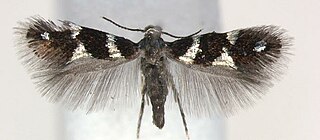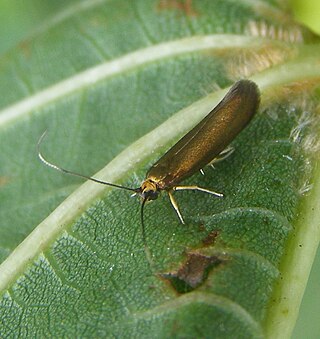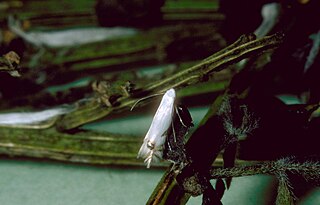
The Plutellidae are a family of moths commonly known as the diamondback moths, named after the diamondback moth of European origin. It was once considered to have three subfamilies: Plutellinae, Praydinae, and Scythropiinae. Praydinae was later elevated to its own family, Praydidae, while Scythropiinae has variously been moved to Yponomeutidae or also elevated to its own family.

The Heliozelidae, commonly known as shield-bearer moths, are a family of small, day flying monotrysian moths distributed worldwide. The larvae of most heliozelid species are leaf miners who cut distinctive shield-shaped cases from the surface of the host leaf, hence the common name. Some species are considered pests of commercial crops such as grapevines, cranberries, and walnuts. The taxonomy of this family is poorly understood.

Pterolonchidae is a small family of very small moths in the superfamily Gelechioidea. There are species native to every continent except Australia and Antarctica.

Roeslerstammiidae is a family of insects in the order Lepidoptera. The family arose from the taxonomic uncertainty of the genus Roeslerstammia Zeller, 1839, which was assigned to different families. The genus Roeslerstammia was removed from the Yponomeutidae Stephens, 1829, and placed in the Amphitheridae Meyrick, 1913, which in consequence became a junior synonym of Roeslerstammiidae. Consequently, Roeslerstammiidae comprises the Palearctic genus Roeslerstammia, as well as the Oriental and Australasian genera that form part of the Amphitheridae.

Dichomeris is a genus of moths in the family Gelechiidae erected by Jacob Hübner in 1818.
Ephysteris is a genus of the twirler moth family (Gelechiidae). Among these, it is assigned to tribe Gnorimoschemini of the subfamily Gelechiinae. Even though it is a rather diverse and widespread group, most of these small and inconspicuous moths were overlooked by scientists until the early 20th century. Almost 90 species are known today but new ones are still being discovered.

Megacraspedus is a genus of moths in the family Gelechiidae, found primarily in the Palearctic.

Metzneria is a genus of moths in the family Gelechiidae, described by Philipp Christoph Zeller in 1839.

Recurvaria is a genus of moths in the family Gelechiidae.

Scrobipalpa is a genus of moths in the family Gelechiidae. Euscrobipalpa has sometimes been treated as a distinct subgenus, or even as a full genus, but is generally no longer recognised as valid, following Ponomarenko & Park (2007).

Eoophyla is a genus of moths of the family Crambidae. It was erected by Charles Swinhoe in 1900.

Parapoynx is a genus of moths of the family Crambidae described by Jacob Hübner in 1825.

Prionapteryx is a genus of moths of the family Crambidae.

Leucoptera is a genus of moths in the family Lyonetiidae. Its members are leaf borers many of which can cause severe damage to plant crops, such as coffee or apples.
Phyllobrostis is a genus of moths in the family Lyonetiidae.
Dryadaula are a genus of moths belonging to the family Tineidae. It was described by Edward Meyrick in 1893, and it belongs to the subfamily or family Dryadaulidae, according to most recent taxonomies.
Compsoctena is a genus of moths in the family Eriocottidae. It was erected by Philipp Christoph Zeller in 1852.
Eriocottis is a genus of moths in the family Eriocottidae.
Cathalistis is a genus of moths in the family Eriocottidae described by Edward Meyrick in 1917.












